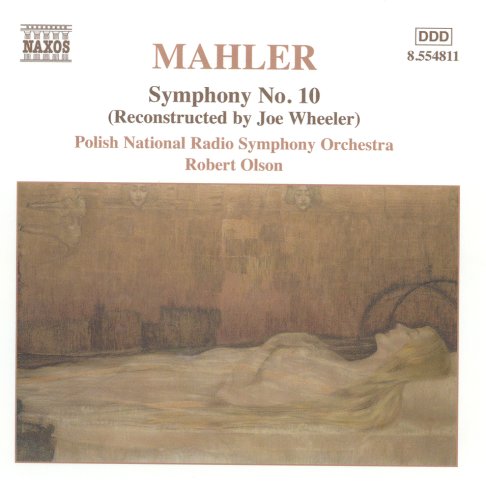Gustav Mahler Album: «Mahler: Symphony No. 10 (Reconstructed by Joe Wheeler)»

- Customers rating: (3.6 of 5)
- Title:Mahler: Symphony No. 10 (Reconstructed by Joe Wheeler)
- Release date:2002-06-18
- Type:Audio CD
- Label:Naxos
- UPC:636943481127
Still, this is a recommendable release--at its bargain price. The string sound takes the ear--impressively full, if sometimes a notch too sweet. This raises again the questions of whether Mahler's manic side needs pointing up, and how far performances of the 10th have to drive home his sense of impending death and the tragedy of his wife's unfaithfulness. It's a matter of taste. The best buy remains Simon Rattle's Berlin Philharmonic performance. --Andrew Green
The Mahler X industry just keeps booming! This disc, with the Wheeler version, comes right on the heels of the latest Cooke version by Rattle and of the Mazzetti version by Lopez-Cobos. Its booklet notes are exemplary, while at the same time constituting an entertaining illustration of this peculiar branch of musicological expertise. No less than three experts are rallied together to vindicate this work's progress out of limbo. Just how far specialism has evolved is finely demonstrated by Olson, the conductor, who did some final editing on the Wheeler score and now worries that the listener may wonder how much of what he hears is Wheeler, and how much is Olson. Apparently we have finally moved completely beyond the question how much of it is Mahler (the composer, remember).
After Cooke, Cooke II, Mazzetti, Mazzetti II and Carpenter, do we really need a Wheeler version of this work? Well, whatever the artistic verdict on his efforts, Wheeler can hardly be accused of piling Ossa on Pelion, because he was actually the very first to produce a finished edition. That in itself seems to entitle him to a hearing. And like the Cooke, Wheeler's edition is one that you can hardly argue with, because it stays very close to the sketches, adding as little as possible. So all doubting Thomases out there, who weren't sure of Mahler X, now have a great opportunity to enrich their musical life and re-evaluate their appreciation of Mahler (be warned: it may be a shock to some to find that the convenient closure provided by the Ninth's `farewell to life' in truth is nothing of the kind!). Naxos's pricing is low risk as ever, and one could do worse orchestra-wise than with the Polish N.O. Their horn section deserves special mention: it is superb and would do the greatest of orchestras proud. The rest of the wind section doesn't yield much to that high standard. Which is more than can be said of the strings, who enliven proceedings with not quite occasional lapses of ensemble and intonation. Nevertheless, they play with conviction and great warmth and fullness of tone. The recording is rather good, much richer than the strangely opaque and lacklustre sound EMI produced for Rattle's latest (and otherwise brilliant) recording in Berlin. However, the biggest moments lack sufficient power, especially in the bass regions. Also, this is yet another of those myriad recordings where the bass drum is generally inaudible, and if audible, sounds like a tenor drum hit with a wooden stick. Which is pretty disastrous at the start of the Finale, where the bass drum is at the core of the drama!
Without a score at hand, it is hard to judge what aspects of the music making itself are true to the Wheeler-edition or rather part of this particular interpretation of it. In general this version seems to share with Mazzetti II a certain chamber-like quality and light-footedness, though here the music emerges more of a piece, less fragmented than on Lopez-Cobos's recording of the Mazzetti edition. Even the opening adagio sounds peaceful and beneficent instead of dark and brooding. As with Mazzetti II, this approach entails the loss of more tormented and demonic aspects of the music. The famous, climactic cluster-chord fails to devastate (and the trumpet soaring above it seems in a bit of a struggle to keep its piercing note going). The `Purgatorio' movement acquires a rustic, almost jolly earthiness that I'm not sure is what Mahler meant. The harrowing spookiness pervading the final pages of Scherzo II and the start of the Finale are also lost on Wheeler (or Olson) - actually, the funereal events opening the Finale are hurried by at an astonishing (and in my view unlikely) allegretto tempo! (Maybe the undertaker had another job waiting?). But then that incredible flute solo emerges and we are on home ground again. The final pages are as moving here as they ever were anywhere, and are themselves reason enough to hear this disc. But then again, this is not the `library choice', so even if you harbour only a slightly more than passing interest in this work, it is worthwhile to invest in a more probing interpretation. You don't need to worry much about editions, because interestingly Cooke, Mazzetti, Wheeler and their permutations, for all their differences in surface detail,in the end all sound very much like the same work. There is, as Alma Mahler tearfully concluded after hearing Cooke's version, `so much Mahler in the score', that the immutable essence of the music is there, pure vintage Mahler. As for recordings, the strangely underrated Chailly on Decca remains my favourite; but if sound quality is not a major concern to you, Rattle's Berlin recording is probably the one to go for.
It's a pity that editors such as Carpenter and Wheeler aren't around, so that we can find just how much of what happens in these kinds of recordings are due to what they - "they" being the editors - wanted, and what is simply a matter of the conductor's own perogative. Either way, we have to live with the results. I really feel that Joseph Wheeler's is the weakest of all the completions recorded so far. I like his quicker tempi (or Olson's) for the two scherzo movements. But Wheeler's first scherzo has a fair amount of unidiomatic percussion writing for late Mahler, especially with the snare drum and bass drum; not to mention Wheeler's strange underemployment of the low pitch instrumets: double basses, tuba, bass clarinet, contrabassoon, etc. In other words, it's very light in the bass. The second scherzo is also relatively quick, but also wants in good-old modern German "expressionism"; especially in regards to the sudden outbursts towards the end of the movement. Worse of all, is Wheeler's very awkward transition from the fourth movement, into the (formerly) slow introduction that begins the fifth movement. He links them with two bass drum strokes, as Mahler indicates, but they're placed right next to each other (I think Rattle has proven that a single stroke is better). That is to say, Wheeler (Olson? Naxos?) hardly waits at all before making the second stroke on the drum. Stranger yet, is the real fast tempo for the ascending lines that Mahler had clearly indicated to be played by a solo tuba; now replaced by the double basses. It's hard to guess what Wheeler was trying to get at here. Too bad, because his version - and/or Olson's conducting - really comes to life in the faster paced development section, located just before the reprise of the first movement's harrowing, "expressionistic" anti-climax. But just as with the Cooke version (most performances, that is), the last half of the fifth movement falls right back to sleep: limp, prostrate, almost passionless. It almost makes one wonder what all those psychological freakouts earlier on were all about. Naxos' sound quality leaves plenty to be desired as well. The short "Purgatorio" movement, by the way, is done rather well here - slower than usual, and not at all "skipped over" as it almost is on the highly touted Michael Gielen M-X (sorry, not a fan).
Recommendations? I know that many folks feel that the Clinton Carpenter version goes too far in becoming Mahler/Carpenter. But at least Carpenter's orchestration and pastiche composing is more idiomatic of late Mahler, if also conjuring up early Alban Berg at times as well. Regardless, the Andrew Litton recording (Delos) is far better played and recorded than this one. In addition, either recording of either of Mazzetti's two versions is a safe bet (he revised it before the Lopez-Cobos/Cincinnati one). As far as the reliable but also under-cooked Cooke version goes, I think it's darn near impossible to beat the original Eugene Ormandy one - FINALLY reissued on a decent sounding CD. I'm not a big fan of the Barshai version, but it DOES come with a very fine performance of Mahler's fifth symphony - all at a bargain price.
Although the Cooke has things to like about it (I'll pass on the Carpenter and have not heard the Mazzetti), after getting the chance to listen to the Wheeler for the first time, I became convinced this is the best overall realization. It does have a starkness that points it toward the post-tonal 20th century.
That said, I wouldn't be surprised if somebody comes out with a "Wheeler 2," trying to nuance it with some of the best features of Cooke.
Now, as for the sound quality. I believe most the problems here, such as the weak bass drum in the "death knell," is due to recording/engineering quality of this CD. Part of it may also be due to this particular orchestra and conductor.
That said, I would LOVE to hear Boulez record this. I'm sure the result would be his best Mahler ever.
It's no surprise that Robert Olson's recording of the Wheeler Mahler Tenth is the only one commercially available. The more widely accepted Deryck Cooke version displays much greater imaginaiton in its orchestration and greater fidelity to Mahler's style. One reviewer here who admires the Wheeler completion says that it's unfair to dismiss it as "incomplete", "underdeveloped", "sparse" or "simple." Actually, those words apply all too well. Wheeler was a brass player, and he favors the horns monotonously in Scherzo I. HIs worst idea is to speed up the bass drum thwacks at the end of Scherzo II and the opening of the finale. They are robbed of all gravity n their emotional impact.
In fairness, the Wheeler Tenth isn't done any favors by the scrawny-sounding Polish orhcestra, and Mr. Olson is obviously more a scholar than a conductor. Two of these movements are full-fledged Mahler (the opening Adagio and third-movement Purgatorio), which he conducts like an amateur. In all, this CD exists to satisfy the curiosity of Mahler fans who hunger for every completion of the Tenth, no matter what.
There is a real problem with any version of the 10th. Despite whoever did the completion I have long felt that the final version in Mahler's hand would not sound like this. Another reviewer said that it really does not matter who did the completion as they all sound about the same. I tend to agree but I have still thought that the Cooke version was best.
This is the only budget version of the 10th and it is as good as any out there. I have liked Rattle and Chailly but this version is decent.
Too bad Mahler never really finished his 10th, and Bruckner his 9th, and Elgar his 3rd and Sibelius his 8th and Tchaikovsky his 7th. The list goes on. I understand someone once claimed there is a Beethoven 10th. Now THAT would be interesting !

